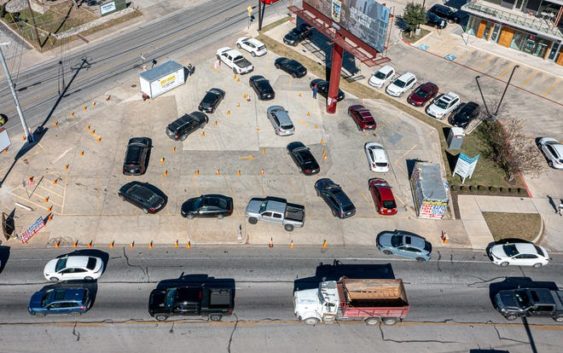- $40 million to go to underserved SC counties for Hurricane Helene recovery. Here's what you need to know.
- Family honors Air Force veteran Derwin Anderson Jr. after he died in June flash floods
- City of Wilmington addresses flooding on New Centre Drive
- Harnett County fire: Two homes damaged
- Medical examiner identifies 13th victim from massive flash flood in San Antonio
Flooding emergency rooms, calling 911: Texans go to great lengths to find COVID-19 tests

When San Antonio residents struggle to get their hands on COVID-19 test, some show up to the emergency room for a diagnosis.
Dr. Ralph Riviello, the chair of emergency medicine at University Hospital, said the number of people who arrive seeking a test has grown so much lately that the emergency room now has a nurse provider designated to screen and evaluate patients with COVID-like symptoms.
The hospital staff helps whoever arrives, but Riviello said the health care system does not have the bandwidth to serve as a walk-in COVID-19 testing center.
“That burden puts stress on the system, on that emergency department. Those patients will take up space and rooms that they may not need,” he said. “And then that delays the care of another patient.”
As the highly contagious omicron variant drives a new surge in COVID-19 cases and hospitalizations across the state, the demand for testing in Texas has increased, draining local pharmacies’ supply of rapid antigen tests and limiting appointment availability at testing centers.
The demand has already added additional strain to the health care and emergency systems. In Austin, the city health department has asked residents to stop calling 911 for testing information. Other emergency rooms across the state are also reporting a jump in testing requests, prompting hospitals to ask Texans to stop visiting the ER for COVID-19 tests. Riviello encourages those experiencing mild symptoms to stay home if they cannot acquire a test.
CVS and Walgreens pharmacies have also instituted a limit on testing products in stores and online to increase access for more people. A Walgreens spokesperson said the pharmacy was working with its lab partners to expand testing capacities.

In response to the high demand for tests, the Federal Emergency Management Agency will open six testing sites in Texas as early as next week. The sites will be located in Bexar, Cameron, Dallas, Harris, Hidalgo and Tarrant counties. The new testing locations received preliminary approval Monday after Gov. Greg Abbott requested additional federal resources to help mitigate the spread of the virus.
State health data shows the positivity rate in the state — or the percentage of COVID-19 tests that come back positive — has reached a record high, with about 1 in 3 Texans testing positive for the virus. The number of hospitalizations has more than doubled over the past two weeks.
Dallas County Judge Clay Jenkins said he expects the demand for COVID-19 tests to increase. Dallas County has opened four locations to meet the demand and plans to open four additional locations by next week, he said.
Dr. Lane Aiena, an outpatient physician at Huntsville Family Medicine, said his clinic used to have boxes of tests available. Now they’re down to just a handful.
Aiena said the health care system — including physicians’ offices, pharmacies and manufacturers across the country — was not prepared to meet the increased demand for tests when it jumped.
“Everyone had a set amount of tests available for what we were experiencing and what we had experienced,” he said. “There’s just such an incredible sudden surge in demand that the system was not prepared for it.”
The real impact of the current spike in cases may be difficult to determine as demand for at-home COVID-19 tests has soared. Those tests aren’t automatically reported to the state, which could affect the state’s understanding of how many Texans are testing positive for the virus.
And with limited testing availability forcing Texans to forgo getting tested, health experts are concerned that even more cases are going underreported.
“I’m afraid that it’s not going to explain what the system is trying to shoulder,” Aiena said.
Austin resident Vi La Bianca said they tried to schedule a COVID-19 test after experiencing fatigue and a scratchy throat on Christmas morning, but the earliest appointment they could find was a week out. La Bianca decided to isolate and stay at home but said that, without a test result, people might be inclined to downplay their symptoms.
“I didn’t have access to a test so I couldn’t tell one way or the other. And because I wanted to go see friends, my first thought was, ‘oh well, it’s probably nothing,’” La Bianca said. “It just left a lot of open ends that would have been really helpful to have been close.”
Disclosure: Google and Quest Diagnostics have been financial supporters of The Texas Tribune, a nonprofit, nonpartisan news organization that is funded in part by donations from members, foundations and corporate sponsors. Financial supporters play no role in the Tribune’s journalism. Find a complete list of them here.
This article originally appeared in The Texas Tribune at https://www.texastribune.org/2022/01/05/texas-covid-19-testing-shortage/.
The Texas Tribune is a member-supported, nonpartisan newsroom informing and engaging Texans on state politics and policy. Learn more at texastribune.org.
More:Three cases of COVID-19 omicron variant confirmed in Nueces County
More:With rise in COVID testing, health district’s resources are tight
More:COVID-19: Here’s a list of positive cases from CCISD, Flour Bluff schools for January
More:Amid latest COVID spike, Texas hospitals say staffing shortage is accelerating
